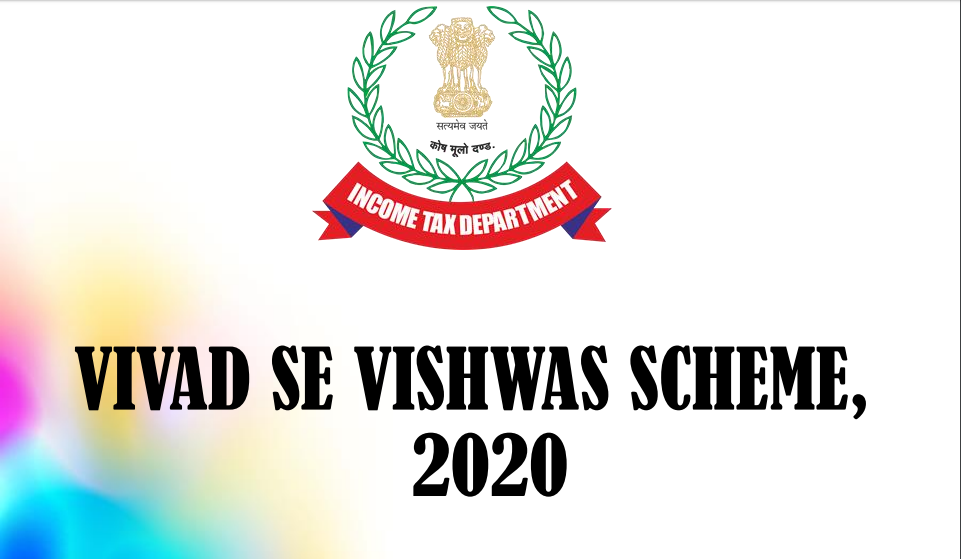VIVAD SE VISHWAS SCHEME, 2020
Table of Contents
VIVAD SE VISHWAS SCHEME, 2020
Why this Scheme?
- To reduce the disputed tax demand pending before appellate authorities i.e. CIT(A), ITAT, High Court and Supreme Court.
- To generate timely revenue.
- To save the time, energy and resources of the taxpayer as well as the Government of India.
Benefits of the Scheme
- Complete waiver of Interest, Penalty, and Prosecution.
- A sensible way to resolve disputes without moving to court.
- Advantageous scheme for the taxpayers.
Applicability of the Scheme
In case of all pending appeals before CIT(A), ITAT, High Court and Supreme Court as on 31st January 2020.
Disputes Covered: All disputes, subject to some exclusion, in relation to the-
▪Disputed Tax
▪Disputed Penalty
▪Disputed Interest
▪Disputed Fee
▪Disputed TDS/TCS
Eligibility Conditions
- Appeals/writs filed on or before 31.01.2020 and pending.
- Orders for which time for filing the appeal has not expired on 31.01.2020
- Case pending before Dispute Resolution Panel (DRP) on 31.01.2020
- Cases where DRP issued direction on or before 31.01.2020 but no order has been passed.
- Cases where assessee filed revision (Section 264) on or before 31.01.2020.
- Search case if the disputed demand is less than Rs. 5 Crore for a particular financial year.
- The appeals/writs filed by the taxpayers or the department.
- Disputes, where the payment has already been made, shall also be eligible.
- Cases in arbitration in India or Abroad
Exclusions under the Scheme
• Search cases if disputed tax is more than Rs. 5 Crore.
• Prosecution cases under the Income-tax Act or IPC filed by the Department.
• Cases relating to undisclosed foreign income and assets.
• Cases completed on the basis of information from foreign countries as per section 90 or 90A.
• Cases covered under offense under IPC, the Unlawful Activities (Prevention) Act, 1967, NDPS Act, 1985, PC Act, 1988, PMLA Act, 2002, COFEPOSA Act, 1974, Prohibition of Benami Property Transactions Act, 1988 and Special Court Trial in Securities Act, 1992.
What is a Disputed tax?
“disputed tax”, in relation to an assessment year or financial year, as the case may be, means the income-tax, including surcharge and cess (hereafter in this clause referred to as the amount of tax) payable by the appellant under the provisions of the Income-tax Act, 1961, as computed hereunder:-
• (A) in a case where an appeal, writ petition or special leave petition is pending before the appellate forum as on the specified date,
• the amount of tax that is payable by the appellant
• if such appeal or writ petition or special leave petition was to be decided against him;
• (B) in a case where an order in an appeal or in the writ petition has been passed by the appellate forum on or before the specified date,
• and the time for filing an appeal or special leave petition against such order has not expired as on that date, • the amount of tax payable by the appellant after giving effect to the order so passed;
• (C) in a case where the order has been passed by the Assessing Officer on or before the specified date, and the time for filing an appeal against such order has not expired as on that date,
• the amount of tax payable by the appellant in accordance with such order;
• (D) in a case where objection filed by the appellant is pending before the Dispute Resolution Panel under section 144C of the Income-tax Act as on the specified date,
• the amount of tax payable by the appellant if the Dispute Resolution Panel was to confirm the variation proposed in the draft order;
• (E) in a case where Dispute Resolution Panel has issued any direction under sub-section (5) of section 144C of the Income-tax Act and the Assessing Officer has not passed the order under sub-section (13) of that section on or before the specified date,
• the amount of tax payable by the appellant as per the assessment order to be passed by the Assessing Officer under sub-section (13) thereof;
Download the copy:
 ConsultEase Administrator
ConsultEase Administrator
Consultant
Faridabad, India
As a Consultease Administrator, I'm responsible for the smooth administration of our portal. Reach out to me in case you need help.








